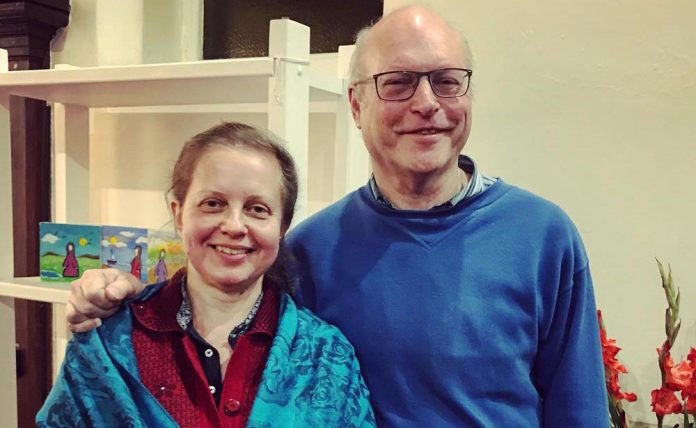Curved humans with egg-shaped faces, maternal figures that might be the Madonna, suns that could be halos, strolling lovers, and Greek and Australian landscapes signified by a single Cypress tree, a bare-branched gum or subtle changes in the tones of the sky and earth…
These are some of the elemental images found in Grace Wilkinson’s paintings in her solo exhibition Colourscape, whose jewel-like colours brighten the Orchard Gallery in Waterloo for those attending the June 22 launch.
Curator Catherine Skipper says she saw one painting of Grace’s some time ago and asked if she could see the rest.
“From that one painting I knew what else I was going to see – and I wanted her to have this exhibition. To me they are lovely paintings of the human soul with its loneliness, its longing, its joy and its love.
“I was immediately drawn to the lack of features on the face, which allow you to see whatever you want. Grace also uses colour in an open way. That glorious red!”
A number of Grace’s works arise from a painful upbringing and a life split between Australia and Greece, which left her feeling isolated in both places.
“In Greece, I was the Australian girl, the daughter of the Pentecostal guy, an outsider.”
Grace points to her painting of internationally renowned singer and television personality Nana Mouskouri and says that Nana had helped her then and since to find the strength to carry on.
“Nana came to sing in Athens when I was a teenager and I fell in love with her voice, firstly because it’s a little bit fragile, and I like fragile things. At the same time, she can be strong. When you see her with her glasses and her austere style, she’s strong, and that’s what we women need – to be sweet and to be strong, and to be friends with each other.”
Nana was also the one for Greek girls to feel a connection with the West, Grace says, because she left Greece young and made a career in France, Britain and other countries, and later came back.
“I was born in Australia, so her Western-style music was part of me. But her Greek music was also the more melodic and new-wave style that I like, and not the heavy and stern music of some.
“Nana was a role model for me. When I was back in Australia, I was feeling lonely, because my Mum had died overseas. Reading her biography, I realised she’d also been also alone in other countries and felt like a stranger – and I found courage.”
Grace says Nana was forbidden to take her end-of-year classical exams at the conservatorium because she’d been singing jazz in nightclubs to earn money. But she’d persevered – working hard to become an internationally renowned singer and television personality.
“I always identify with people who don’t give up,” Grace says. “It doesn’t matter if you have humble beginnings, you follow your dream. And I love Nana also because she’s doing a lot of charitable work taking on some of Audrey Hepburn’s work with UNICEF.
“I also have almost all of her songs and know all the lyrics!”
Grace was born in Muswellbrook and went to Greece when she was 5. Her mother was Greek Orthodox from the city and her father was a villager with right-wing politics. He loved Australia but her mother wanted to go back to Greece. So, they did.
Ongoing tensions between her parents over Orthodox and Pentecostal Christianity led Grace to Catholicism.
“I was very strict with myself as a teenager, trying to do the right thing and change the world. In my late 40s I am not so black and white.
“Because I grew up in a bit of a conflict, what I try to do is marry things and make them nice together. That’s also what makes Australia special – if we do it the right way.”
Grace studied art, graphic design and icon painting in Athens and porcelain art in Australia. She has had group and solo shows in Athens and Sydney. Earlier this year she taught the art group at Poets Corner in Redfern for 12 weeks.
She says some of the paintings in Colourscape are from her “serious life and serious loneliness” – and all spring from her heartfelt attempt to express her feelings.
“In these works, I can see people in love, I can see a mother and child. But it’s interesting, isn’t it, how you can feel like anyone is your child, or that you are one yourself?
“I don’t like to paint very cruel things because I just want to give the message. If you understand this figure is a human and that they are sad – for me, this is enough. I don’t want to make it really hard for you to see.”
In recent years, Grace is glad to have found love and belonging in Australia, thanks to people like her partner Michael, the staff at Counterpoint Community Services, and Aunty Norma Ingram who comforted her once when she admitted she felt like a gypsy who didn’t belong anywhere. “Aunty Norma hugged me and said, ‘You are Australian.’ That was so nice.”
Grace glances around the gallery and seems pleased to have conveyed the things that mean most to her.
“It’s like it’s me [in these works] everywhere, and not. That’s what I like: everybody can feel they can be singers, everybody can do anything they want, if we have love together. I believe in love, with the Greek meaning agápe – which is not only amorous love, it’s every kind of love.
“Life can be a difficult journey, so we must help each other. Agápe is what’s most important.”
_______________
Colourscape was at the Orchard Gallery from June 22 to July 31. The gallery’s next exhibition, new works by artist-in-residence Hayley Megan French, opens on August 10.





